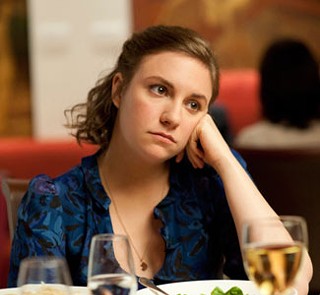Talking About Talking About Talking About 'Girls'
Oh boy
By Sarah Smith, 8:41PM, Sun. Apr. 22, 2012
The most chilling cinematic moment of my year occurred not during the brutal rape scenes of The Girl With the Dragon Tattoo but rather when I realized that Aura, Lena Dunham's largely autobiographical protagonist of Tiny Furniture, wears the same cowboy boots I wear.
Returning to her mother's august, modern studio after a day's insults (low-paying job, emotionally distant yet demanding man friends), Aura face-plants miserably, boots dangling from some piece of midcentury-modern furniture. No no no no, I thought. That's not me. Can't possibly be me. As a snarky, bangs-having, Ray-Bans-wearing writer type with a surfeit of polka-dot dresses and an education that prepared me for, well, talking about those things snarkily, I'm definitely a plausible sort of target audience for Dunham's brand of unflinching openness about the shitty realities of twentysomething Sturm und Drang. Rather than being an anonymous watcher of yet another indie spin on the “gee, growing up sure is hard” genre, I realized with a twang that this film was actually watching me back, and further, that I was watching it in bed on a Saturday morning in last night's makeup. Touché.
Girls, Dunham's Judd Apatow-produced HBO series, stakes out similar terrain and cribs many characters directly from Tiny Furniture (which broke at SXSW Film 2010, by the way). The ghost of Sex and the City hangs about palpably; if anything, the show's writers tried a tad too hard to counter the association by giving Shoshanna (Zosia Mamet), the most naive character, a bunch of silly lines in which she wonders whether she's a Carrie or a Charlotte. But really, the essential goings-on here are familiar stuff: dude problems, “who am I?” problems, and career problems charted not in the lives of professional Manhattanites who can afford a truly hilarious amount of shoes but rather in the broke, overeduacted Brooklyn morass in which “success” might mean claiming thousands of Twitter followers or a thriving YouTube channel. Unlike Tiny Furniture, Girls shies away from family dynamics to focus on the ins and outs of four friends' lives, and in doing so, somehow loses the self-identifying pathos noted above, replacing it with an aloof, too-cool-to-really-care version of the same material.
Chatter about Girls has reached such a saturation point that it's hard to believe the amount of discourse surrounding the mere hour of show that has, to date, been on offer. One well-traveled avenue for critiquing it is to call out its characters for being a whiny, entitled bunch of trust-funders; in its opening scene, Hannah, Dunham's avatar this time around, asks her parents for an $1,100 per month allowance so she can continue her unpaid internship at an indie publishing house and work on her autobiography. (Which, really?) When they deny her, she hits full tailspin mode and shows up later at their hotel to make an impassioned, drug-fueled plea for her own special case. Defenders of the show are quick to claim all this self-abasement as the searing portrayal of millennials in crisis; at the sagacious age of 28, I must have missed the generational quirk that would make this scene resonant, but such as it is, can't deny that particular claim as unfounded. However, critics lamenting the overwhelming whiteness of the show do so with much better ammo, including, among other things, a leaked audition call sheet peppered with one-line roles for people of color – mostly, it is worth noting, as nannies – and staff writer Lesley Arfin's shallow, racist Twitter responses to critiques of the show.
But as many bloggo-commentators have pointed out, Girls being all whiteness and all privilege is nothing new as far as the small screen is concerned. Um, Seinfeld. Um, Gossip Girl. The show incurs so much bile because its premise of being the un-cola version of all the other hapless media about women (90210, Real Housewives of wherever, every Katherine Heigl vehicle) creates truly untenable expectations. This effect is not Dunham's doing. Any TV show or movie about ladies slightly different from the yoga-doing, kooky-best-friend-having prototype available all over the place will draw an exhausting number of think-pieces about women as characters and women as consumers of entertainment. This, more so than any of the contentious elements of the show, makes it a lightning rod for the very real gripes of women who have been sold a dumbed-down version of their own lives. Girls approximates much of contemporary lady-ness better than its predecessors, but that makes it all the more exhausting to see it stop short.
Really, good stories are part honesty and part fantasy. Too much of either skews the result. Having watched a screener of the series' first three episodes, I can attest that this narrative gathers momentum, and anyway, it's unfair to judge too harshly on a pilot episode, even considering the consistently high-gloss programming HBO presents. Have you watched the pilot of 30 Rock recently? It's clear that the whole Jack-and-Liz storyline shifted once the actors contributed a little nuance to parts that were initially oppositional caricatures. While Girls may benefit from its unflinching attitudes toward the sex lives and selfishness of a particular generation, it's still too chilly to capture an audience beyond the fraction of women who see themselves, cowboy boots and all, in its version of events. Let's hope for some alchemy among the actors, enough animus to keep the act of parsing the whole thing from being a precarious, vitriol-driven slog.
A note to readers: Bold and uncensored, The Austin Chronicle has been Austin’s independent news source for over 40 years, expressing the community’s political and environmental concerns and supporting its active cultural scene. Now more than ever, we need your support to continue supplying Austin with independent, free press. If real news is important to you, please consider making a donation of $5, $10 or whatever you can afford, to help keep our journalism on stands.









